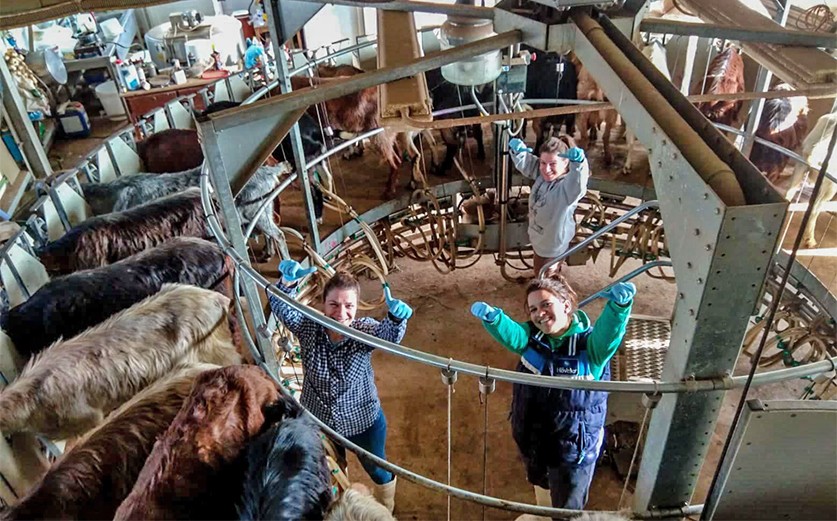Meet The Karra Sisters
Ioanna Karra, 28, and her twin sisters Zoe and Athanasia, 26, are fourth-generation goat farmers from Elinokastro, 25 kilometers outside of Trikala. They manage the family farm “Karra-Mandraki” with 1.200 free-range goats. The sisters attended the “Summer School” training program implemented by the Agricultural University of Athens, part of the New Agriculture for a New Generation program.
From an early age, the sisters would go to the farm and take the goats into the mountains. “We lived as migrant farmers for the first 12 years of our lives,” Ioanna said. “Every summer, from May to October, we played with the goats. We lived in a cabin, and sometimes we would have to change their grazing areas. We went all the way up to Grevena. At first, our mother wanted us to do something else because goat farming is hard work. But we don’t mind. Now we work together with our mother and our uncle. If we don’t have time for vacation, it doesn’t bother us.”
It’s not an easy life. A typical day on the farm runs from 7 in the morning to six in the evening, when the sisters make cheese and test out new products. They work in all weather conditions, and sometimes they have problems with hunters who scare the goats or kill their dogs. And if they don’t have enough dogs to protect the goats while they graze, they can fall prey to wolves. “In the last 2 months, we lost 15 goats,” Ioanna said.
The sisters knew from an early age that they wanted to work on the farm and pursued studies that would help them modernize and develop the family business. Ioanna studied economics at the University of Piraeus and then graduated from the Dairy School of Ioannina. The twins studied at the National Polytechnic University of Athens: Zoe studied chemical engineering with a specialization in food, and Athanasia studied electrical and computer engineering with a specialization in engines and energy. While at university, the sisters worked on the farm during vacations and holidays. They have been working with the goats full-time since 2015.
Ioanna and her sisters are improving the production process and stabilizing the quality of their products. For example, when heating milk to make yogurt, their mother used to check the temperature with her hand. If she could hold her hand in the milk for 30 seconds, she knew it was time to add the yogurt culture. Now the sisters heat the milk to a precise temperature. “It was difficult for our parents to deal with new technology,” Ioanna said. “We can track the health of the goats, the food they eat, their milk quality. We have the know-how and the time.”
The goats graze in the forest and return to the farm to sleep and be milked. The University of Thessalias provides GPS devices so that the sisters can track the goats and see what plants they eat. “We have 15 dogs to guide the goats, and we take shifts following them around,” Ioanna said. “The goats give birth around October, and we separate the pregnant goats from the rest. We follow the pregnant ones with a car and take them back to the farm when it’s time.”
Visions for the Future
The Karra sisters would like to launch their own brand of goat milk products: milk, yogurt, kefir, cream cheese, and other goat cheeses. They want to prove that the plants that the goats eat (which range from mint and cistus to oak or strawberry plants) have an impact not only on the taste of their milk, but also on its nutritional value. During AUA’s week-long “Summer School” in Trikala, the sisters sampled different products like feta cheese with truffle oil, which gave them ideas for products of their own. They also received theoretical training and professional advice and had a chance to meet other local producers.
“We want to move forward, but it’s much harder than it was 10 years ago,” Ioanna said. “The price of milk goes down every year, and profits are dropping. Now 0.45 euros per kilo for regular goat milk and 0.50 euros per kilo for organic goat milk is considered a good price.” The sisters want to open a plant to process free-range milk products with other local producers in order to give their milk the value it deserves. They’ve made sketches and studies for the new business and applied to a Greek program that gives money to farmers so that they can manufacture products. But it’s been difficult to find collaborators. “There are five other goat farmers in Elinokastro, but they are skeptical of our plan. They think we have an ulterior motive,” Ioanna said. “Before, everyone wanted to be at the top, but now people want to cooperate. We really want to change the mentality.”
In the future, the sisters would like to welcome visitors to the farm to see how they work. “You could play with a little goat, see how it is milked and fed, then follow the goat paths through the forest, and at the end, we could offer some of our unique products,” Ioanna said. “Most people admire the fact that we are young women running this farm. We want people to love goats as much as we do. They are very clever!”

